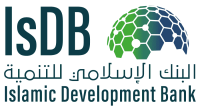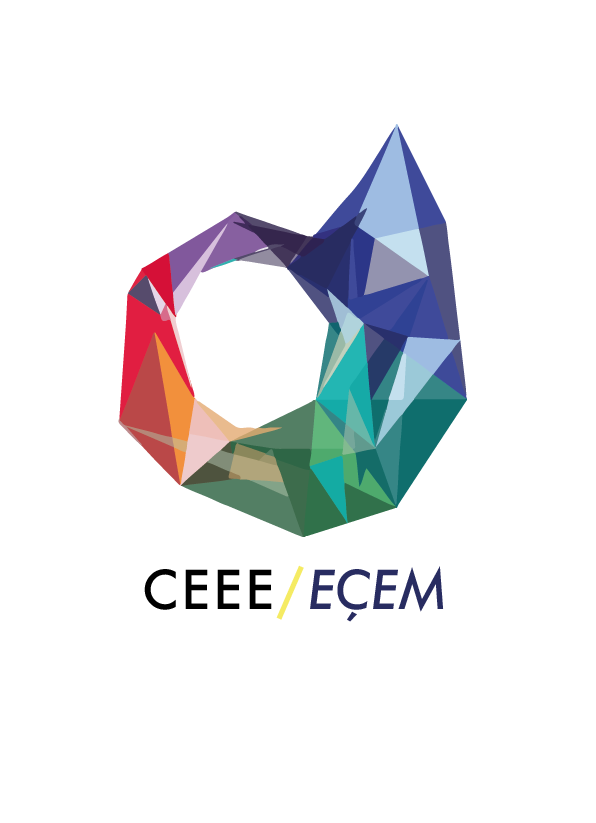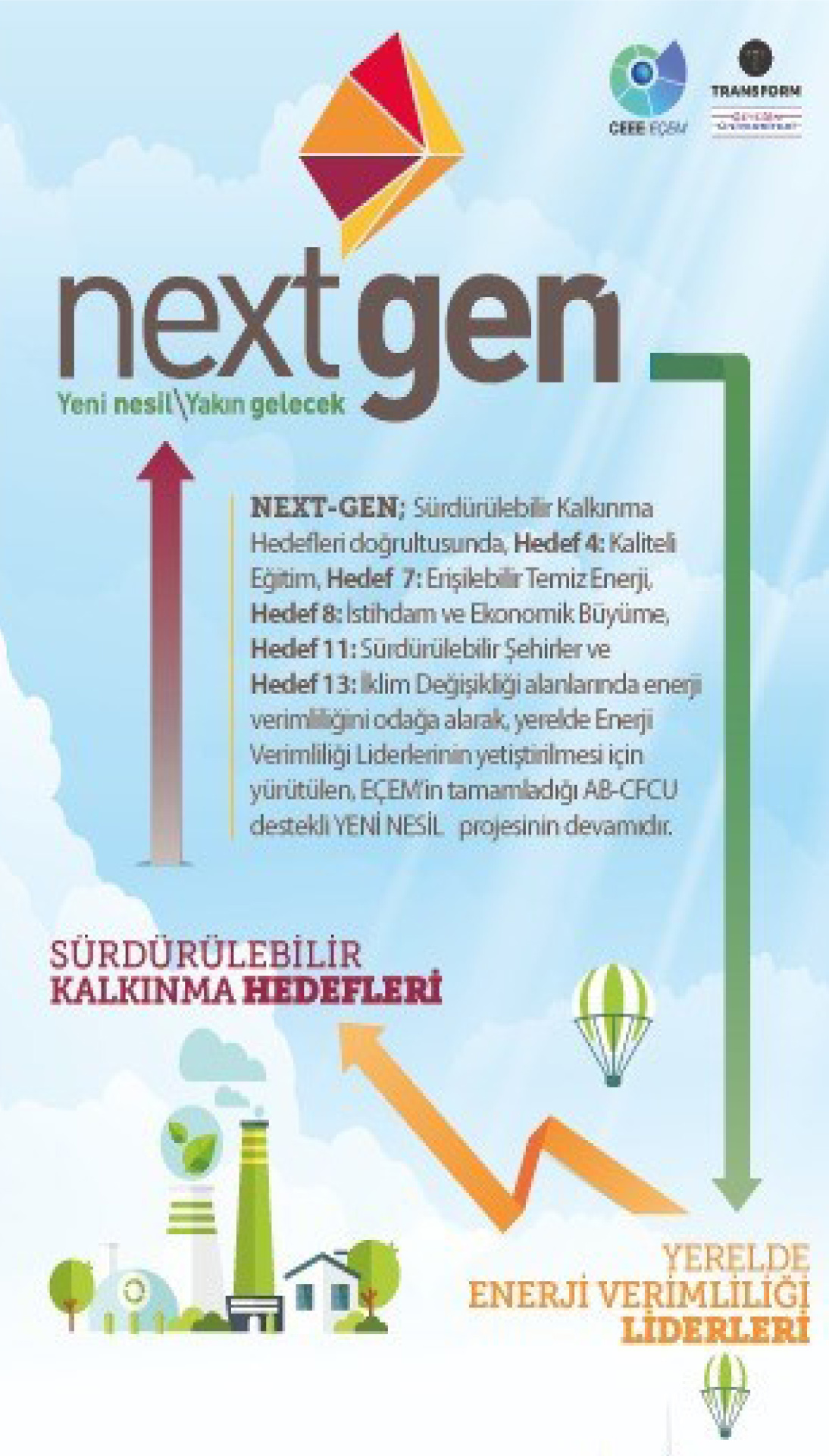Project Starting – Ending Dates: 01/07/2019 – 01/09/2020
Funded by: Islamic Development Bank Transformers Fund
Project Budget: IsDB Contribution: 143.467,00 $
Özyeğin – CEEE budget: 143.467,00 $
Project Team: M. Pınar Mengüç, Yasemin Somuncu, Nil Kutlar, Dilek Saygı
Project Partners: Turkey: CENTER FOR ENERGY, ENVIRONMENT AND
ECONOMY (CEEE)
Participant Municipalities: ADIYAMAN MUN., BATMAN MUN., DIYARBAKIR METROPOLITAN MUN., KAHRAMANMARAŞ MM, KILIS MUN., MARDIN MM, GAZIANTEP MM, SIIRT MUN., ŞANLIURFA MM, ŞIRNAK MUN.
Pilot Schools: ADIYAMAN MIMAR SINAN VTHS, BATMAN CUMHURIYET VTHS, DIYARBAKIR VTHS, GAZIANTEP KANUNI SULTAN SÜLEYMAN VTHS, KAHRAMANMARAŞ ŞEHIT IDARI ATAŞE GALIP ÖZMEN VTHS, KILIS VTHS,
MARDIN VTHS, SIIRT IMKB GAZI VTHS, ŞANLIURFA KARAKÖPRÜ VTHS, ŞIRNAK CIZRE VTHS
Other people and organizations who contributed to NEXT – GEN Project: CEEE (Yasemin Somuncu, Nil Kutlar, Cem Keskin, Dilek Saygı, Neslişah Doğan, Gülçin Mezireli) Özyeğin University (Deniz Sert, Cafer Çavdar)
National Education Ministry Social Partners and Projects Directorate (Şennur Çetin), Vocational and Technical Education General Directorate (Şehnaz Çivici, Kahraman Paşaoğlu) DEFANS Consultancy Agency (Aytül Çalışkan),
ONUR ENERGY (Onur Günduru, Emre Yaman)
Motto Consultancy, Engineering and Technology


NEDEN
NEXTGEN project was conducted with the aim of creating an effective and widespread education culture on energy efficiency throughout Turkey. Like in the EUCapacity Yeni Nesil Project, the goal was to train future local energy efficiency leaders; however, this time we focused on Southeastern Turkey, and took action in 10 provinces and 10 schools, and an additional one in Ankara.
YÖNTEM
“Energy Efficiency” and “Renewable Energy” mo dules were prepared and and sent to teachers in 11 pilot schools that were determined by the Turkish Ministry of National Education (M.E.B.). The teachers who were selected fort his task were trained by CEEE and M.E.B. personnel in joint Workshops. By using other innovative concepts developed by CEEE to vocational and technical high school students, we aimed t oto have advan ced energy applications to be implemented to the future buildings.
At these 11 selected pilot schools in Southeast Anatolia and Ankara, energy monitoring was conducted with the help of an Energy Efficiency Consultancy (EVD) company who is a member of EYODER.
With the help of an artificialintelligence suppor ted ChatBot, students, teachers and citizens th roughout Turkey had the chance to benefit from the Energy Efficiency Modules. At the end of the 20192020 Education Year, a report was prepa red based on the collected feedback from teac hers and students about the module. These re ports were delivered to the M.E.B. and the other related divisions.
Thanks to the artificialintelligence supported ChatBot, which was started to be used during NEXTGEN trainings; students, teachers and ci tizens throughout Turkey have the chance to be nefit from the Energy Efficiency Module. At the end of the 20192020 Education Period, a report will be prepared according to collected feedba ck from teachers and students about the module and the report will be delivered to the M.E.B. and the relevant departments.
UYGULAMA ALANI
NEXTGEN Project was implemented in 10 Vocational and Technical High Schools (VTHS) from 10 provinces in Southeastern Turkey. These schools are as follows:
- Adıyaman Mimar Sinan VTHS, City Center, Adıyaman;
- Cumhuriyet VTHS, City Center, Batman;
- Diyarbakır VTHS, Yenişehir, Diyarbakır;
- Kanuni Sultan Süleyman VTHS, Şehitkamil, Gaziantep;
- Şehit Idari Ataşe Galip Özmen VTHS, Onikişubat, Kahramanmaraş;
- Kilis VTHS, City Center, Kilis;
- Mardin VTHS, Artuklu, Mardin;
- IMKB Gazi VTHS, City Center, Siirt;
- Karaköprü VTHS, Karaköprü, Şanlıurfa;
- Cizre VTHS, Cizre, Şırnak;
IMPACT
With NEXTGEN Project, we ensured that energy efficiency leaders and practitioners were trained at the local level and the awareness of energy efficiency in the society would be transferred from generation to generation.
Considering that Turkey’s dependency in energy to outside sources is around 70%, the efforts of this project likely contribute to the country’s economy. At the same time, less energy consumption and decreased carbon emissions will help to minimize the negative impact of excessive energy use on climate change.
Technological Innovation Competition
CEEE Technological Innovation Competition was held within the scope of the NEXTGEN Project.
This competition was designed to measure the skills gained by the students during the course of the study. We voted on the submissions by considering three key questions: if the problem was understood, if an innovative solution was proposed, and if the proposed solution was transformed to an action.
At the end of the competition, four students received the honorable mention awards. They were Atilla Şil with the project ‘’Smart Greenhouse’’ and Bakır Barış Atay with the project ‘’Smart House’’ from Şanlıurfa Karaköprü Vocational and Technical Anatolian High School, and Muhammed Emir Karaçam with “Sun Screen” and and Feyzullah Karlı for “Let the Efficiency of Our Roads Be Open” projects from Siirt IMKB Gazi Vocational and Technical Anatolian High School. We would also like to emphasize the contributions of the teachers: Ömer Pakyürek from Siirt IMKB Gazi Vocational and Technical Anatolian High School and Gökhan Özdemir and Muhammet Sami Yıldırım from Şanlıurfa Karaköprü Vocational and Technical Anatolian High School.
Debate Paper
published on vocational training in energy refugess and livelihood by Deniz Ş. Sert, Yasemin Somuncu and Nil Kutlar in UIK Panorama

Guide for Energy Efficiency in Buildings
The energy efficiency guide, which contains detailed outline for energy efficiency, was published within the scope of NEXTGEN project. The guide includes possible applications in terms of facades, heating systems and boilers, cooling systems, solar water heater systems, photovoltaic systems, heat pumps, new generation systems, lighting, electrical devices, electric motors and energy management systems. It is anticipated that the guide will contribute both to the participating municipalities in to all pilot cities, as well as to all schools in Turkey.






